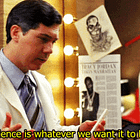
After Donald Trump made a habit of insisting that any good economic news coming from the Biden and Obama administrations had to be fake, it shouldn’t come as much of a surprise that there’s now evidence that Trump’s administration might be cooking the books to hide just how bad the Great Leader’s tariffs are. As Politico reports, political appointees held back a scheduled Department of Agriculture forecast and stripped out its accompanying written analysis “because it predicts an increase in the nation’s trade deficit in farm goods.”
After all, Trump says his tariffs are wonderful, and that they’ll force other countries to move their factories here, so it would be rather inconvenient for a report to come right out and predict the exact opposite, because those are really inconvenient facts. So instead, the quarterly report was released a week late, and officials decided to “block publication of the written analysis normally attached to the report because they disliked what it said about the [trade] deficit.”
But don’t you go accusing the administration of fudging the numbers — hey, that would make for a yummy photo illustration! — because as Politico notes, the actual data is no different from how they appeared in the unredacted original. They’re just shorn of the goddamned words that would have put tariffs in a bad light. Any embarrassing conclusions about what they meant will have to come from third party analysts, who could then be accused of lying because they hate America.
This is hardly trivial stuff, either, because these quarterly forecasts and their analysis of farm imports and experts are used by commodities traders and agricultural groups to make real-world decisions. It is very serious agribusiness, man. And even without the usual written analysis, it ain’t great news, projecting the current fiscal year’s agricultural trade deficit at $49.5 billion, a new record that dwarfs last year’s also-record $31.8 billion. That’s an increase of 55 percent over the farm-trade deficit that Republicans said last year showed Joe Biden was terrible for farmers.
So why does the agriculture department think that’s happening? Shut up, none of your business. That analysis was determined to be bad for America, so down the memory hole it went.
Politico’s sources said that May’s report reflected Trump’s going back and forth on whether his huge tariffs would stay or would they go, and no, the administration will not come on and let us know.
Former head USDA economist Joe Glauber, who is allowed to go on the record because he no longer works there, told Politico there’s a lot of stuff beyond tariffs that decide whether there’s going to be a trade deficit or surplus.
Americans’ love for blueberries year-round, loyalty to French wines and addiction to goods like coffees — which the U.S. largely does not produce — also contribute. A strong dollar can also widen the deficit.
“What we’re importing is largely not what we’re exporting,” he said, noting that prices for common U.S. agricultural imports, such as wine and liquor, are not as volatile as the nation’s agricultural exports like soybeans.
This seems like a good spot to add this WTF video from yesterday, in which Rep. Madeliene Dean (D-Pennsylvania) grilled Commerce Secretary Lucille Bluth Howard Lutnick about the tariff on banana imports, which is 10 percent wherever they come from (for now).
DEAN (brandishing banana): What’s the tariff on bananas? Americans, by the way, love bananas. We buy billions of them a year. I love bananas. What’s the tariff on bananas?
LUTNICK: The tariff on bananas would be representative of the countries that produce them
DEAN: And what’s that tariff?
LUTNICK: Generally, 10 percent.
DEAN: Walmart has already increased the cost of bananas by 8%.
LUTNICK: As countries do deals with us, that will go to zero.
Dean noted that until, and if, that happens, prices are still higher for consumers, and the her Q&A period ran out of time.
But Luttnick couldn’t help himself! He requested extra time so he could brilliantly repeat the administration’s talking point: Just shift production to the USA and you’ll avoid the tariff!
LUTNICK: There’s no uncertainty if you build in America and you produce your product in America. There will be no tariff.
DEAN: We can’t produce bananas in America.
LUTNICK: The concept of building in America and paying no tariffs is very, very clear.
DEAN: We cannot build bananas in America
Silly lady just didn’t get the point! All foreign countries need to do is start building their bananas here, or to make a trade deal to get the tariff down to zero, which would of course leave countries that had started building banana assembly factories here out millions of dollars, which is why we still have a fucking trade deficit in the first place, but we won’t report it, OK?
Of course, it’s not just the banana deficit that the feds are hiding; as NPR reports, economists worry that Trump’s huge staffing cuts at federal agencies will embugger economic data, even without any outright intervention to monkey around with the numbers. (Monkeys, like the American consumer, also love bananas.)
That isn’t merely a theoretical banana concern, either:
Every month, hundreds of government employees check the price of goods and services in cities around the country and those numbers are crunched to produce the inflation measure known as the consumer price index, or CPI.
This week, the Labor Department said it had cut back on price checks nationwide and suspended them entirely in some cities because it didn’t have enough people to do the work.
But don’t worry, the department said the cutbacks will have “minimal impact” on the national inflation reports, although oops, there could be less accuracy in reports on the cost-of-living reports for regions where data collection was cut, and possibly for particular products, too. And already, the CPI report for last month had to rely on “educated guesses” for some goods, basing the estimates on similar items. In the Trump era, official economic statistics are in danger of becoming literally only “close enough for government work.”
But that’s fine, really, because then instead of troublesome data, we can just rely on taking the administration’s word for it, and isn’t that a lot easier anyway? It worked out fine during the pandemic, after all.

Why The F*ck Did Trump Tell Hospitals To Stop Sending COVID-19 Data To CDC?
[Politico / NPR]
Yr Wonkette is funded entirely by reader donations. If you can, please become a paid subscriber, or if a one-time donation works better for you, click this button and donate the price of a banana. How much can one banana cost?
www.wonkette.com (Article Sourced Website)
#Trumps #Cooking #Books #Predicted
